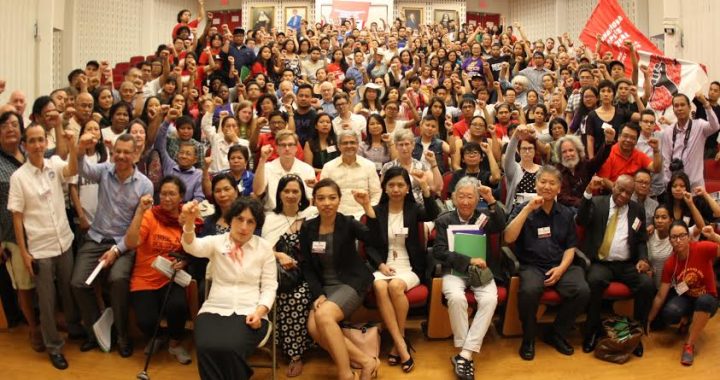By Azadeh Shahshahani, NLG President
For three powerful days, July 16-18, I had the honor of participating as a member of the jury in the International Peoples Tribunal (IPT) on crimes against the Filipino people by President Benigno S. Aquino and the U.S. Government, as represented by President Barack Obama. Convened by human rights defenders, lawyers, jurists, academics, people of faith, political activists, and several organizations including the NLG, the goal of the IPT was to shine a light on these crimes and hold the Philippine and U.S. governments accountable. It was held at the behest of victims of human rights violations and other crimes committed under Aquino’s presidency.
The NLG has had a longstanding relationship with our counterpart in the Philippines, the National Union of People’s Lawyers (NUPL), and has acted in solidarity with NUPL, especially during the dictatorship of Ferdinand Marcos. The NLG Philippines Subcommittee has maintained close contact with NUPL, with several of us visiting Quezon City in July 2013 for the International Conference on Human Rights and Peace in the Philippines.
The IPT further strengthened our partnership. We learned how the Aquino regime, with support from the U.S. through military intervention, economic and environmental exploitation and imposition of neoliberal globalization, committed systematic violations of civil, political, economic, social, and cultural rights of the Filipino people. The three counts of the complaint were:
1. Violations of civil and political rights, including extrajudicial killings, disappearances, massacres, torture, arbitrary arrests and detention as well as other brutal, systematic attacks on basic democratic rights through the U.S.-inspired counterinsurgency program Oplan Bayanihan.
2. Violations of economic, social, and cultural rights through the imposition of neoliberal policies, transgression of economic sovereignty, and various forms of economic plunder and attacks on the livelihoods of the people and destruction of the environment.
3. Violations of the right to national self-determination and liberation through the imposition of the U.S. war of terror, US military intervention, as well as the perpetration of crimes against humanity and war crimes; misrepresentations of the people’s right to national liberation and self-determination as “terrorism” and “terrorist” listing of individuals, organizations, and other entities by the U.S. and other governments.
We heard harrowing testimony from several victims present in D.C. and in the Philippines. One of the most moving was that of Melissa Roxas, a U.S. citizen of Filipino descent, who was kidnapped by Philippines military forces, tortured, and disappeared for several days in 2009 while conducting a medical survey in La Paz, Tarlac. Despite the U.S. embassy’s knowledge of the situation, it refused to intervene. No one has been held accountable for this crime.
After extensive deliberations, the jury reached a verdict of guilty on all counts.
The Tribunal also condemned the defendants’ abandonment of the peace process and their failure to address the roots of the conflict in order to achieve a just and lasting peace. The Tribunal called on defendants to stop the commission or continuance of criminal acts, repair damages done to Filipinos and their environment, compensate victims and their families, and rehabilitate these communities—especially the indigenous communities that were particularly affected.
The Tribunal also called for these to be brought before international bodies including the Prosecutor’s Office of the International Criminal Court (ICC) as well as the Inter-American, European, African, and Asian regional courts to expose these crimes and push these international bodies to enjoin the illegal acts of the defendants and stop their impunity. Upon announcement of the verdict, the room broke into applause. Victims and family members stood with raised fists. Observers gave a standing ovation for their courageous presence and testimony. They closed chanting, “Makibaka, Huwag Matakot!” (Struggle onward, have no fear!).
My most memorable moment was when a Filipino activist approached me and said: “Thank you. When you announced the guilty verdict, I could not hold my tears back. Thank you.”
I look forward to participating in another people’s tribunal in September in NYC, this one focused on the crimes of the Mexican government, particularly the disappearance of the 43 Ayotzinapa students, in complicity with the U.S. Government. Both the NLG and the NLG-NYC Chapter are co-sponsoring.
To learn more about the International People’s Tribunal on the Philippines, visit internationalpeoplestribunal.org
Featured Image: Tribunal participants celebrate following the verdict. (IPT)

